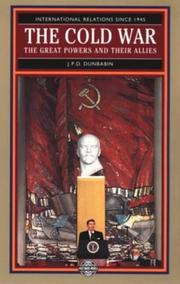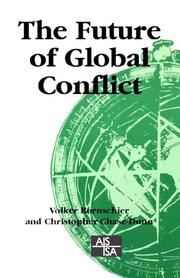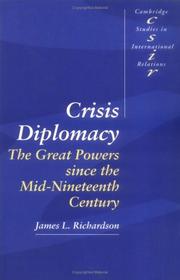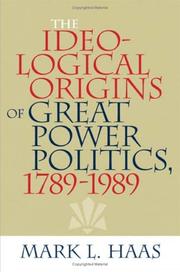| Listing 1 - 10 of 68 | << page >> |
Sort by
|
Book
ISBN: 1315843994 1317893549 9781317893547 1317893530 Year: 2014 Publisher: Hoboken Taylor and Francis
Abstract | Keywords | Export | Availability | Bookmark
 Loading...
Loading...Choose an application
- Reference Manager
- EndNote
- RefWorks (Direct export to RefWorks)
The Birth of a Great Power System, 1740-1815 examines a key development in modern European history: the origins and emergence of a competitive state system.H.M. Scott demonstrates how the well-known and dramatic events of these decades - the emergence of Russia and Prussia; the three partitions of Poland; the continuing retreat of the Ottoman Empire; the unprecedented territorial expansion of Revolutionary and Napoleonic France, halted by the final defeat of Napoleon - were part of a wider process that created the modern great power system, dominated by Europe's five leading states.Enhanced by
Great powers --- Powers, Great --- Super powers --- Superpowers --- World politics --- History --- Europe --- Politics and government
Book
ISBN: 0875866654 9780875866659 0875866638 9780875866635 0875866646 9780875866642 9780875866635 9780875866642 Year: 2008 Publisher: New York Algora Pub.
Abstract | Keywords | Export | Availability | Bookmark
 Loading...
Loading...Choose an application
- Reference Manager
- EndNote
- RefWorks (Direct export to RefWorks)
Imperialism --- Great powers --- Powers, Great --- Super powers --- Superpowers --- World politics --- History --- United States --- Foreign relations --- Territorial expansion. --- Military policy. --- Annexations
Digital
Year: 1642 Publisher: Imprinted at London By Robert Barker ... and by the assignes of John Bill
Abstract | Keywords | Export | Availability | Bookmark
 Loading...
Loading...Choose an application
- Reference Manager
- EndNote
- RefWorks (Direct export to RefWorks)

ISBN: 0582227194 Year: 1994 Volume: 2 Publisher: London New York Longman
Abstract | Keywords | Export | Availability | Bookmark
 Loading...
Loading...Choose an application
- Reference Manager
- EndNote
- RefWorks (Direct export to RefWorks)
International groups --- Cold War --- Grandes puissances --- Great powers --- Grote mogendheden --- Guerre froide --- Koude oorlog --- Mogendheden [Grote ] --- Oorlog [Koude ] --- Powers [Great] --- Puissances [Grandes] --- World politics --- 1945 --- -Great powers
Book
ISBN: 0333760697 Year: 1999 Publisher: London Macmillan Press
Abstract | Keywords | Export | Availability | Bookmark
 Loading...
Loading...Choose an application
- Reference Manager
- EndNote
- RefWorks (Direct export to RefWorks)
Grandes puissances --- Great powers --- Grote mogendheden --- Mogendheden [Grote ] --- Powers [Great] --- Puissances [Grandes] --- World politics --- 1989 --- -United States --- Foreign relations --- -Great powers

ISBN: 1446218163 1848609078 1283880652 0585352887 9780585352886 0761958657 9780761958659 0761958665 9780761958666 9781446218167 9781848609075 9781283880657 Year: 1999 Publisher: London Thousand Oaks, Calif. Sage Publications
Abstract | Keywords | Export | Availability | Bookmark
 Loading...
Loading...Choose an application
- Reference Manager
- EndNote
- RefWorks (Direct export to RefWorks)
In this critical analysis of long-term trends and recent developments in world systems the contributors' works include comprehensive discussion of the economic, political and military role of the Pacific Rim, former Soviet Union and Japan.
World politics --- Great powers. --- Twenty-first century --- Powers, Great --- Super powers --- Superpowers --- World politics - 1989 --- -Great powers. --- Twenty-first century - Forecasts
Book
ISBN: 1108110215 1108105440 0511997663 1107011957 1107676169 9780511997662 9781107011953 9781107676169 Year: 2017 Publisher: Cambridge Cambridge University Press
Abstract | Keywords | Export | Availability | Bookmark
 Loading...
Loading...Choose an application
- Reference Manager
- EndNote
- RefWorks (Direct export to RefWorks)
The Japanese experience of war from the late-nineteenth to the mid-twentieth century presents a stunning example of the meteoric rise and shattering fall of a great power. As Japan modernized and became the one non-European great power, its leaders concluded that an empire on the Asian mainland required the containment of Russia. Japan won the First Sino-Japanese War (1894-5) and the Russo-Japanese War (1904-5) but became overextended in the Second Sino-Japanese War (1931-45), which escalated, with profound consequences, into World War II. A combination of incomplete institution building, an increasingly lethal international environment, a skewed balance between civil and military authority, and a misunderstanding of geopolitics explains these divergent outcomes. This analytical survey examines themes including the development of Japanese institutions, diversity of opinion within the government, domestic politics, Japanese foreign policy and China's anti-Japanese responses. It is an essential guide for those interested in history, politics and international relations.
Strategy --- Great powers --- Political culture --- Imperialism --- Culture --- Political science --- Powers, Great --- Super powers --- Superpowers --- World politics --- History. --- Japan --- History, Military --- Military policy. --- Foreign relations
Book
ISBN: 0197646670 0197646654 0197646662 Year: 2023 Publisher: New York, NY Oxford University Press
Abstract | Keywords | Export | Availability | Bookmark
 Loading...
Loading...Choose an application
- Reference Manager
- EndNote
- RefWorks (Direct export to RefWorks)
How do great countries stay that way? The United States is the most powerful actor in the international system, but it is facing a set of challenges that might lead to its decline as this century unfolds. This book looks to the past for guidance, examining the grand strategy of previous superpowers to see how they maintained, or failed to maintain, their status. Over the course of six cases, from ancient Rome to the British Empire, it seeks guidance from the past for present U.S. policymakers. How did previous empires, regional hegemons, or simply dominant powers forge grand strategy? How did they define their interests, and then assemble the tools to address them? What did they do right, and where did they err? What-if anything-can current U.S. strategists learn from the experience of earlier superpowers?
U.S. foreign policy --- grand strategy --- Strategy --- Great powers --- History. --- Powers, Great --- Super powers --- Superpowers --- World politics --- Military strategy --- Military art and science --- Military doctrine

ISBN: 0521459877 0521453925 0511559119 Year: 1994 Volume: 35 Publisher: Cambridge New York Melbourne Cambridge University Press
Abstract | Keywords | Export | Availability | Bookmark
 Loading...
Loading...Choose an application
- Reference Manager
- EndNote
- RefWorks (Direct export to RefWorks)
Although much has been written on international crises, the literature suffers from a lack of historical depth, and a proliferation of competing theoretical frameworks. Through case studies drawing on the rich historical experience of crisis diplomacy, James Richardson offers an integrated analysis based on a critical assessment of the main theoretical approaches. Due weight is given to systemic and structural factors, but also to the specific historical factors of each case, and to theories which do not presuppose rationality as well as those which do. Crisis diplomacy the major political choices made by decision makers, and their strategies, judgments and misjudgments - is found to play a crucial role in each of the case studies. This broad historical inquiry is especially timely when the ending of the Cold War has removed the settled parameters within which the superpowers conducted their crisis diplomacy.
International relations. Foreign policy --- World history --- anno 1800-1999 --- Grandes puissances --- Great powers --- Grote mogendheden --- Mogendheden [Grote ] --- Powers [Great] --- Puissances [Grandes] --- 820 Internationale Betrekkingen --- 823 Diplomatie --- 830 Economie --- 850 Vrede- en conflictstudies --- 852 Internationale conflicten --- 856.1 Conflictpreventie --- World politics --- 19th century --- 20th century --- Powers, Great --- Super powers --- Superpowers --- Social Sciences --- Political Science --- Great powers.

ISBN: 0801443210 0801474078 1501732463 9780801474071 Year: 2007 Volume: *18 Publisher: Ithaca, N.Y.: Cornell university press,
Abstract | Keywords | Export | Availability | Bookmark
 Loading...
Loading...Choose an application
- Reference Manager
- EndNote
- RefWorks (Direct export to RefWorks)
Colonialism --- Grandes puissances --- Great powers --- Grote mogendheden --- Histoire politique --- Ideologie --- Ideology --- Idéologie --- International politics --- Internationale politiek --- Mogendheden [Grote ] --- Political history --- Politics [International ] --- Politics [World ] --- Politiek [Internationale ] --- Politieke geschiedenis --- Politique internationale --- Powers [Great] --- Puissances [Grandes] --- World politics --- International relations --- Decision making
| Listing 1 - 10 of 68 | << page >> |
Sort by
|

 Search
Search Feedback
Feedback About UniCat
About UniCat  Help
Help News
News